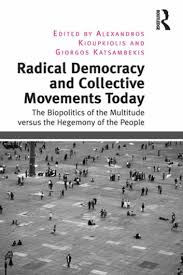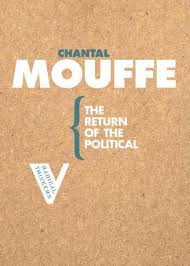In this week’s article, we reprint an interview from the Political Observer on Populism with Giorgos Katsambekis addressing many thorny issues of contemporary democracy. Left-wing populist movements across the globe, malfunctions of representative democracy, the dialectic between people and politicians, horizontal and vertical dimensions of populist mobilisation, the potential democratic renewal inherent in forms of direct democracy, the future of social democracy.

POP) The more I read about populist movements across the globe – in particular (but not only) left-wing movements – the more I get the impression that modern populism is the answer to a widespread intolerance towards representative democracy. Podemos emerged from the street protests of the Indignados, the 5 Star Movement was created upon Beppe Grillo’s shows and rallies held in Italian squares, Syriza capitalized on the Greek aganaktismenoi, Berny Sanders has taken on much of the issues of the Occupy Wall Street movement, and so on. Is it possible to say that, compared to the 1980s and 1990s, new populist parties now start as bottom-up, grassroots movements, before becoming more institutionalized and eventually going through a process of normalization?
GK) I think that populism is better understood as a response to perceived shortcomings or ‘malfunctions’ of representation; not a negation of the latter. Even movements like the Indignados and Occupy are not necessarily intolerant towards representative democracy per se. They rather expressed a severe frustration with the state of representative politics in today’s world, as they mobilised against political elites that have become unresponsive, detached from the people’s grievances, anxieties and aspirations, as well as against institutions that lack democratic legitimation and accountability but seriously influence their well-being. They might have called for ‘real’ or ‘direct’ democracy, while shouting to the elites ‘you do not represent us!’, but in practice they have developed organic links with institutional actors (parties or politicians) like the ones mentioned above. This reinforces the hypothesis that many among the people protesting in the streets were actually looking for a ‘better,’ more effective representation.
Now, if we take a step further and think of representation in its broader sense, not just its institutional expression in modern societies (e.g. delegation), we see that most of the recent populist movements were firmly grounded in representative politics. For example, when Occupiers in Zuccotti Park and Puerta del Sol assembled and drafted their declarations or resolutions, they claimed to speak in the name of the whole of society (the ‘99%’). In this sense, they sought to represent the millions of people that weren’t actually participating in the movement, but they assumed they were sharing the same frustrations and aspirations. I am noting this to make the point that we need to be more alert to the various nuances and articulations of representative politics (direct participation versus representation is not necessarily a black or white relationship). Moreover, I also want to stress that with populist politics we are always stuck within representation, as there is no populism without the claim to speak in the name of a broader collectivity (‘the people,’ the ‘many,’ and so on and so forth).
There must for sure be something between political opportunists and stand-up comedy. pic.twitter.com/6jPFO1ExS2
— Takis Pappas (@takisspappas) June 4, 2018
Moving on to the recent pattern in populist mobilisation that you observe, from the movement-form to party politics, let me remind you that one of the most paradigmatic manifestations of populism more than a century ago developed in the exact same sequence: from the bottom up, from the grassroots to institutional politics, first in the form of a challenger party, then incorporated and absorbed into an established political actor. I am referring to the populist movement in the United States of the late 19th century, which led to the establishment of the People’s Party, which was later absorbed into the Democratic Party. In this sense, the emergence of populism from the grassroots and its ‘transmutation’ to institutional politics is nothing new. There are more examples we can think of, like the Polish Solidarity in the 1980s, or the indigenous and coca growers’ movement in Bolivia from the mid-1990s onwards.
On the other hand, most populist parties in recent decades, especially in Europe from the 1970s and 1980s onwards, had emerged in a top-down way, built around strong leaders and vertical power structures. Jean Marine Le Pen’s Front National in France, List Pim Fortuyn and Geert Wilders’ Party for Freedom in the Netherlands, the Freedom Party of Austria under Jörg Haider are just a few among the many relevant examples. But lately, we have indeed seen several successful populist parties emerging in strong connection to populist grassroots movements. SYRIZAcapitalised on the dynamic of the anti-austerity movement, while Podemos was almost literally born out of the squares. And this did not only happen on the left. We have also witnessed similar phenomena in the populist radical right, something rather unprecedented. The breakthrough of the Alternative for Germany is impossible to understand without taking into account the party’s organic links with the anti-Islam PEGIDA movement. So, why does populism seem to emerge all the more often in the movement-form today compared to what we’ve seen in the past?
On the one hand a mass movement for democracy and internationalism as the #PeoplesVoteMarch gets underway. On the other a ragtag collection of bigots in the form of #Pegida, UK Unity and Freedom, and the #edl. Says a great deal.https://t.co/OA1WMrB7is
— Robert Massey (@RobertMMassey) June 23, 2018
I think that this development can be connected to the long crisis of representation that contemporary liberal democracies have been going through well before the so-called Great Recession hit the US and Europe. Scholars have been talking about the emergence of post-democracy as well as the ‘hollowing out’ of democratic institutions and the establishment of a post-political consensus in western societies for at least two decades now. So, if populism (among other things) is the outcome and expression of accumulated grievances and frustrated demands, then the increasing manifestation of grassroots populist movements might reveal a lack of institutional actors that could express those sentiments at the time that they manifest in a more or less unified form. In this context, the emergence of grassroots populism can trigger the transformation of existing parties that seek to represent those anti-establishment populist currents (e.g. SYRIZA) or lead to the emergence of brand new political actors that seem to spring right out of the movements themselves (e.g. Podemos). And indeed the canon for now has been a further ‘normalisation’ and moderation of the populist dynamic through institutionalisation. But this is not necessary or inescapable. Think for example cases of populist mobilisation in Latin America, like Evo Morales in Bolivia, where the movement has managed to keep the government in check, while pursuing a radical progressive agenda.
So, what is crucial for me here is rather to reflect upon the relationship between the horizontal and verticaldimensions of populist mobilisation. Can we imagine the terms of an articulation of the horizontal dimension of social movements with vertical one of the party form in a way that does not dismantle or suppress the radical emancipatory potential of the former?
POP) What is the future of liberal and representative democracy? What about responsiveness and accountability? How can they be restored?
 GK) I don’t think I can provide an answer on the future of liberal and representative democracy in general. I share the view of many scholars that we live in transitory times, which means that contemporary societies are undergoing several simultaneous transformations on many levels, with unpredictable results. Think, for example, the ongoing discussion about the ‘Information Revolution’ and its impact on democratic institutions and norms as well as on modes of production. Trying to narrow it down to the political realm, it seems rather safe to assume that the – until yesterday – hegemonic model of a liberal-centrist consensus is not only in crisis, but also effectively outdated. Sharp socio-political divisions are back, new ideological cleavages gain salience, concerns about (collective) identity return to the forefront, while numerous social movements around the world highlight an increasing demand for better representation, more effective accountability and indeed for political alternatives. To put it in a nutshell, elites on both sides of the Atlantic are forced to shift their attention from administration and governance, back to politics. And politics is much messier and divisive.
GK) I don’t think I can provide an answer on the future of liberal and representative democracy in general. I share the view of many scholars that we live in transitory times, which means that contemporary societies are undergoing several simultaneous transformations on many levels, with unpredictable results. Think, for example, the ongoing discussion about the ‘Information Revolution’ and its impact on democratic institutions and norms as well as on modes of production. Trying to narrow it down to the political realm, it seems rather safe to assume that the – until yesterday – hegemonic model of a liberal-centrist consensus is not only in crisis, but also effectively outdated. Sharp socio-political divisions are back, new ideological cleavages gain salience, concerns about (collective) identity return to the forefront, while numerous social movements around the world highlight an increasing demand for better representation, more effective accountability and indeed for political alternatives. To put it in a nutshell, elites on both sides of the Atlantic are forced to shift their attention from administration and governance, back to politics. And politics is much messier and divisive.
In this sense, the key task for today’s political elites and democratic citizens lies in trying to respond to the emerging challenges in a way that furthers and deepens democracy, a way that combats new inequalities and promotes socio-economic and cultural inclusion, while being open to experimentation and innovation. As I see it, resorting to what we already know, trying to protect norms and procedures that we consider familiar and ‘safe,’ is not the answer. This, I’m afraid, has been the counterproductive attitude of the European political elites so far, who never seem to waste time to condemn any challenger political force that gains momentum as ‘dangerous populism,’ ignoring ideological differentiations and programmatic agendas, overlooking issues of democratic legitimation and popular accountability, while supressing the underlying causes and their own responsibility. In this context, radical left politicians like Alexis Tsipras in Greece and Pablo Iglesias in Spain have been lamped together with leaders of the radical right, like Marine Le Pen and Viktor Orbán, all depicted as equally threatening to Europe’s democratic institutions and stability due to their shared populism. This kind of anti-populist reaction is fiercer when it comes to challenging the EU’s fiscal orthodoxy. Recent developments in Italy are particularly telling, with the reactions from Italian and European elites against the possibility of a Eurosceptic politician heading the country’s Finance Ministry, temporarily causing a governmental crisis. Strikingly, no one seems to worry that nativist and xenophobic politicians have assumed other key roles (e.g. Ministry of the Interior) in the government that was eventually formed. It is worrying that nowadays for many among Europe’s top officials closing our ports and borders to people that seek refuge from war and economic hardship is considered more acceptable than challenging the EU’s fiscal policies and common currency.
Back to the 1930s? Trump, Salvini, Orban and the rise of the national populism in the West https://t.co/WDmneoEYMy via @financialtimes
— Lionel Barber (@lionelbarber) June 23, 2018
But to return to your question, restoring responsiveness and accountability in our political systems is also connected to a much needed effort to learn from the challenges that we face. In this sense, not only do we have to address the underlying causes for different kinds of anti-establishment and populist mobilisation (which can be progressive or regressive, democratic or anti-democratic) with concrete policy proposals, but also to experiment with new tools of party organisation, participation, collective decision making and citizens’ consultation. Think for example the use of online resources in the way that Podemos and the 5 Star Movement operate (e.g. simplified processes for membership registration, online referendums and primaries for candidates) or the pan-European networked structure of DiEM25. ‘Going online’ is definitely not a panacea, and we’ve seen how participatory and plebiscitary processes in that form might be effectively undermined or manipulated by strong leaderships. Still, we should not ignore their potential for democratic renewal, especially in today’s societies where socialisation and politicisation is becoming increasingly virtual.
POP) Is it realistic to think that direct democracy can be implemented, and that it can be an improvement compared to representative democracy? Switzerland seems to be a rather exceptional case, the experiment of the 5 Star Movement and several branches of the Pirate Party do not justify a great enthusiasm, and finally the referendum on Brexit seems to confirm all the worst fears. Is it possible to ‘give voice to those without a voice’ through representative democracy or is populism the only credible (and somehow complementary) alternative to direct democracy?
 GK) I don’t believe in easy solutions and either/or dilemmas. Especially when it comes to dealing with democratic challenges. I think that creative responses to our predicament might be more effective when they take a ‘hybrid’ form. To begin with, it is rather utopian to expect that we can achieve any kind of ‘pure’ direct-democracy in mass societies of millions or hundreds of millions. This, however, does not mean that elements of direct participation in decision making cannot be combined with representative forms of government. In this context, institutions that would foster open and plural deliberation would play a key role, ensuring that social subjects develop their own informed and critical perspectives before participating in any process of decision making on critical issues (like ‘Brexit’). I know I am not reinventing the wheel here, and there are definitely numerous ways in which such hybrid systems can crystallise. There are quite a few relevant examples already out there, in different societies. Think for example platforms like Barcelona en Comú and the ways it has experimented with participatory democracy, deliberation and coalition building on the local level.
GK) I don’t believe in easy solutions and either/or dilemmas. Especially when it comes to dealing with democratic challenges. I think that creative responses to our predicament might be more effective when they take a ‘hybrid’ form. To begin with, it is rather utopian to expect that we can achieve any kind of ‘pure’ direct-democracy in mass societies of millions or hundreds of millions. This, however, does not mean that elements of direct participation in decision making cannot be combined with representative forms of government. In this context, institutions that would foster open and plural deliberation would play a key role, ensuring that social subjects develop their own informed and critical perspectives before participating in any process of decision making on critical issues (like ‘Brexit’). I know I am not reinventing the wheel here, and there are definitely numerous ways in which such hybrid systems can crystallise. There are quite a few relevant examples already out there, in different societies. Think for example platforms like Barcelona en Comú and the ways it has experimented with participatory democracy, deliberation and coalition building on the local level.
Now, populism, whether we understand it as a particular discursive logic or a ‘thin-centred ideology,’ is all about constructing ‘the people,’ which means bringing together and expressing different groups and demands by creating a sense of unity and common cause. In this sense, populism is by definition compatible with representation and can also incorporate direct-democratic and participatory elements, depending on the kind of social-linkage strategy it prioritises: participatory or plebiscitary (or maybe both). We thus do not need to speculate whether we have to pick between representative democracy, populism, or direct democracy. Populism is a way of doing politics among many others; a way to mobilise mass constituencies against named opponents and in pursuit of common goals and aspirations. And it can be more or less participatory, more or less direct-democratic, more or less liberal, and so on and so forth. In this context, depending on the particular ideological elements with which it is articulated, populism can take various orientations, sometimes acting as a threat and others as a corrective to democracy. Thus, in my view, the challenge for today’s progressive forces is twofold: on the one hand, to fight against the more authoritarian, nativist and exclusionary manifestations of populism, and on the other to embrace the egalitarian, emancipatory and more inclusionary versions of populism. This is not an easy task, nor does it simply mean that we take a normative position where left-wing populism is good and right-wing populism is bad.
POP) Connected to what you were saying before about European elites: Why do you think that the EU seems to tolerate right-wing populist forces such as Viktor Orbán in Hungary of the PiS government in Poland, but it does not accept any compromise with those on the left, as exemplified by the reactions towards the Syriza-led government in Greece? Is there a future for the EU beyond the liberal democratic dogma? More in general: Is there a future for left-wing populism in the EU?
GK) I’m not sure if there’s a definitive answer on why European elites seem more willing to tolerate authoritarians in government and not left-wing populists that try to challenge the dogma of perpetual austerity. One reason might be that most mainstream political forces throughout Europe, including social-democrats, have effectively moved to the right of the political spectrum after the mid-1990s. Moreover, in their effort to respond to the challenges of the populist radical right, several established centre-right and conservative parties have co-opted the latter’s agenda, adopting stricter policies on immigration as well as on law and order. Most typical examples here are the Dutch VVD (People’s Party for Freedom and Democracy) the Austrian ÖVP (People’s Party), and more recently the centre-right opposition in Greece, ND (New Democracy). This shift of formerly liberal-moderate forces has been also eloquently described as the mainstreaming of the radical or extreme right. And with nativist anti-immigrant positions making it to the mainstream, Europe has stopped being shocked by radical right-wing parties entering governments and pursuing their agendas. Less than twenty years ago, the participation of the FPÖ (Freedom Party) in Austria’s government was an issue of major concern throughout Europe and the cause for sanctions. Today it is politics as usual, as the party has come remarkably close with the ÖVP.
More ‘practical’ explanations might also apply. Namely, the effects on the EU’s economy from a government challenging fiscal orthodoxy or even the very existence of the common currency, the Euro, seem much more tangible than, let’s say, Orbán threatening to close down the Central European University (CEU). An ‘Italexit’ seems bound to send shockwaves throughout Europe’s markets and beyond in the blink of an eye, destabilising European economies and the common currency itself, even creating fears for a new recession. Hence, the stakes in the economy seem much higher and the danger more imminent. We also need to take into account that today’s EU is built on a neoliberal hegemony that despite the cracks caused by the recent crisis is still in place and its advocates are thus keen to delegitimise and fight any alternative. To rephrase Fredric Jameson, for many among the European elites, it seems easier to imagine the end of the world than to imagine a shift in the EU’s social and economic policies.
#Orban's words to @EPPGroup mean nothing. "We're not going to shut down, but we may have to leave the country." https://t.co/bgVR7U3fG3 #CEU pic.twitter.com/nyS80xU6ww
— Stand With CEU! (@StandWithCEU) May 4, 2017
This brings us to the viability of left-wing populism in today’s Europe. We’ve seen what happened in Greece, but also in Spain, where initial enthusiasm and hopes to radically subvert the system were soon frustrated for different yet not totally unrelated reasons. This did not happen because SYRIZA and Podemos were insincere, irresponsible or underprepared. Especially in the first case, a rapid moderation and retreat from an alternative socio-economic programme (which was in fact more social-democratic and less radical-left) was the result of the EU’s severe limitations and restraints. In a sense, the EU has already created an inflexible structure that, especially when it comes to economic policy, pushes political parties to follow more or less variations of the same path. Most aspects of monetary and fiscal policy are predetermined on a central level and negotiated within bodies of debatable democratic accountability and transparency. In this context, the room for manoeuvre, not just for the populist left, but for any alternative economic project is effectively limited. And this is a constant stimulus for popular frustration and rising distrust, as electorates see the parties that they elected to power retreat from their promises.
It is in this sense that Peter Mair has described the EU as a ‘protected sphere,’ deaf to popular anxieties, immune to voices that demand change. In such an environment, it is rather easy to diagnose a radical incompatibility between the popular classes that are increasingly impoverished and marginalised and the unresponsive elites that seem indifferent to their suffering or hostile to their aspirations. This incompatibility has been often (unintentionally) highlighted by the elites themselves, as key European officials have even openly sided with the authority of the ‘markets’ against that of peoples and electorates. Populist forces of different orientations have managed to capitalise on this growing gap between elites and peoples, constructing their own versions of this crisis of political representation. But, contrary to the populist right, the populist left seems to be lacking the resources needed to achieve its goals for a meaningful socio-economic transformation. This leaves the space open to roughly two alternatives: (1) Pursuing a rather defensive politics which accepts the core principles of the EU’s economic orthodoxy, while trying to pass minor counter-reforms that balance neoliberal excesses and gradually restore some of the lost ground. (2) Move towards a radical break with the EU’s rules and provisions and pursue a radical redistributive politics of expansion, even if that means risking an exit from the common currency or the Union itself. But the latter is very likely to undermine the overall project and lead to bigger troubles. The situation looks a lot like a deadlock. And it’s not a surprise that in both Greece and Portugal variations of the first scenario have been preferred by a populist left and social-democratic government respectively.
 In this context, I believe that if there’s a future for the populist left in today’s Europe – a populist left that champions an egalitarian, inclusive and pluralist project for democratic renewal –, this lies in establishing strong links of cooperation and coordination throughout the continent with the aim to effectively challenge the EU’s orthodoxies on a series of issues and influence discussion-making and reform on the central level. But this is only one part of the puzzle. Another significant component for the prospects of progressive change lies in the centre-left’s reinvention of itself. Social-democracy might be in severe crisis, as Chantal Mouffe recently pointed, but it is still the dominant force within the broader European left. Jeremy Corbyn’s Labour in the UK and António Costa’s Socialist Party in Portugal are only two examples of what such parties can achieve if they put socio-economic inclusion, redistribution and regulation back to the core of their priorities, while establishing strong links with social movements and other actors of the left and radical left. On the contrary, social-democratic parties that preferred a shift towards their right, embracing neoliberalism and forming alliances with conservative parties, have faced severe losses or have even been diminished to minor players (e.g. PASOK in Greece, PvdA in the Netherlands).
In this context, I believe that if there’s a future for the populist left in today’s Europe – a populist left that champions an egalitarian, inclusive and pluralist project for democratic renewal –, this lies in establishing strong links of cooperation and coordination throughout the continent with the aim to effectively challenge the EU’s orthodoxies on a series of issues and influence discussion-making and reform on the central level. But this is only one part of the puzzle. Another significant component for the prospects of progressive change lies in the centre-left’s reinvention of itself. Social-democracy might be in severe crisis, as Chantal Mouffe recently pointed, but it is still the dominant force within the broader European left. Jeremy Corbyn’s Labour in the UK and António Costa’s Socialist Party in Portugal are only two examples of what such parties can achieve if they put socio-economic inclusion, redistribution and regulation back to the core of their priorities, while establishing strong links with social movements and other actors of the left and radical left. On the contrary, social-democratic parties that preferred a shift towards their right, embracing neoliberalism and forming alliances with conservative parties, have faced severe losses or have even been diminished to minor players (e.g. PASOK in Greece, PvdA in the Netherlands).
POP) You already mentioned the modern challenges to political representation, but I would like to insist on this aspect: How should mainstream parties react to the issues raised by populist parties? Should they become more populist, in order to survive? Should they listen to the grievances of the people and re-connect with their electorates both in term of policies and procedures?
GK) I would not say that mainstream parties need to become more populist. As I tried to explain earlier, populism by itself does not refer to concrete policies or programmatic agendas. It is a way to construct ‘the people’ while opposing named ‘elites,’ a way to frame socio-political divisions, and in this sense it is highly malleable and can take different and contradicting orientations. This also means that we cannot treat populism as a miraculous cure to the left’s stagnation and impasses.
If Portugal serves as an example for a possible realignment of social-democratic parties, it is also a cautionary example for the radical left. https://t.co/bMahZ55DKD
— Jacobin (@jacobinmag) June 9, 2018
What I believe mainstream parties should do is try to address the popular grievances, frustrations and aspirations that fuel different kinds of anti-establishment and populist mobilisation. Even the kind of reactions that we find utterly anti-democratic and illiberal. There can still be legitimate grievances at their root. For example, what we often see as rising anti-immigrant resentment, might actually be the result of rampant inequalities and widespread dissatisfaction with living standards. The figure of the immigrant or the refugee can pose as a convenient scapegoat for our own problems. The task then of addressing and responding to the root causes of different kinds of populist and anti-establishment mobilisation has different aspects. One is to invent new ways of making citizens feel included and counted in the political process, in both material and symbolic terms. Another one is to address identity anxieties and issues of affective investment. People still need to feel they belong to a broader community, a ‘we.’ Having failed to create a sense of an open and tolerant ‘European people,’ a retreat to the more familiar ‘people-as-nation’ was an easy task for Europe’s radical right, especially when the migrant crisis hit Europe’s door. Hence, the new rise in nationalism and xenophobia.
This brings us back to a discussion about the ‘pragmatic’ and ‘redemptive’ dimensions of democratic politics, which might seem too abstract, but is crucial to understanding what is at stake today. On the level of pragmatic, tangible politics, European mainstream forces need to urgently deal with socio-economic issues and concerns, namely rising inequalities, soaring unemployment and the need of democratic control over financial markets and major multinationals. On the level of symbolic, redemptive politics, Europe desperately needs a narrative that will inspire renewed commitment to a common democratic endeavour. Faith in democracy is very likely to fade if people do not feel that it is through democracy that we are also achieving a more prosperous life and a better future.
Giorgos Katsambekis is a lecturer in European and International Politics at Loughborough University. He has previously worked as a postdoctoral researcher and lecturer at the Aristotle University of Thessaloniki and remains a member of the POPULISMUS research team. His research is located at the intersections of critical political theory and comparative politics with a special focus on populism and discourse analysis. He is also interested in contemporary theories of democracy and post-democracy, social movements, Greek politics and the European radical left. He is the co-editor of the volumes Radical Democracy and Collective Movements Today (Ashgate, 2014) and The Populist Radical Left in Europe (Routledge, forthcoming). His recent work has appeared in The Political Quarterly, Constellations, Javnost–The Public, Contemporary Political Theory and The Journal of Political Ideologies. He tweets @G_Katsambekis.
To read more from the Political Observer for Populism visit their website and twitter.





